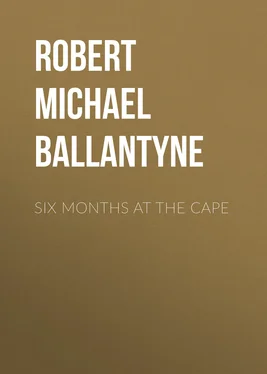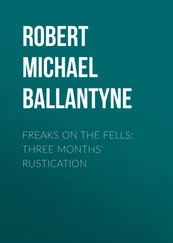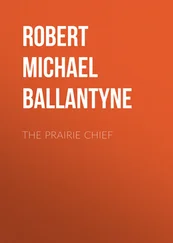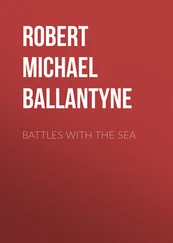Robert Michael Ballantyne - Six Months at the Cape
Здесь есть возможность читать онлайн «Robert Michael Ballantyne - Six Months at the Cape» — ознакомительный отрывок электронной книги совершенно бесплатно, а после прочтения отрывка купить полную версию. В некоторых случаях можно слушать аудио, скачать через торрент в формате fb2 и присутствует краткое содержание. Жанр: Путешествия и география, История, foreign_edu, foreign_antique, foreign_prose, на английском языке. Описание произведения, (предисловие) а так же отзывы посетителей доступны на портале библиотеки ЛибКат.
- Название:Six Months at the Cape
- Автор:
- Жанр:
- Год:неизвестен
- ISBN:нет данных
- Рейтинг книги:3 / 5. Голосов: 1
-
Избранное:Добавить в избранное
- Отзывы:
-
Ваша оценка:
- 60
- 1
- 2
- 3
- 4
- 5
Six Months at the Cape: краткое содержание, описание и аннотация
Предлагаем к чтению аннотацию, описание, краткое содержание или предисловие (зависит от того, что написал сам автор книги «Six Months at the Cape»). Если вы не нашли необходимую информацию о книге — напишите в комментариях, мы постараемся отыскать её.
Six Months at the Cape — читать онлайн ознакомительный отрывок
Ниже представлен текст книги, разбитый по страницам. Система сохранения места последней прочитанной страницы, позволяет с удобством читать онлайн бесплатно книгу «Six Months at the Cape», без необходимости каждый раз заново искать на чём Вы остановились. Поставьте закладку, и сможете в любой момент перейти на страницу, на которой закончили чтение.
Интервал:
Закладка:
In the bunk below Hobson lay a young Wesleyan minister. He was a slender young fellow,—modest and thoughtful. If Hobson’s bunk had given way, I fear that his modesty and thoughtfulness might have been put to a severe test. I looked down upon this young Wesleyan from my materially exalted position, but before the voyage was over I learned to look up to him from a spiritually low position. My impression is that he was a “meek” man. I may be mistaken, but of this am I certain, that he was one of the gentlest, and at the same time one of the most able men in the ship.
But, to return to my berth—which, by the way, I was often loth to do, owing to the confined air below, and the fresh glorious breezes on deck—the man who slept under me was a young banker, a clerk, going out to the Cape to make his fortune, and a fine capable-looking fellow he was, inclined rather to be receptive than communicative. He frequently bumped me with his head in getting up; I, not unfrequently, put a foot upon his nose, or toes, in getting down.
What can I say about the sea that has not been said over and over again in days of old? This, however, is worthy of record, that we passed the famous Bay of Biscay in a dead-calm. We did not “lay” one single “day” on that “Bay of Biscay, O!” The “O!” seems rather awkwardly to imply that I am not stating the exact truth, but I assure you that it is a fact. More than this, we had not a storm all the way to the Cape. It was a pure pleasure excursion—a sort of yacht voyage—from beginning to end; very pleasant at the time, and delightful now to dwell upon; for, besides the satisfaction of making a new friend like Hobson, there were others to whom I was powerfully drawn, both by natural sympathy and intellectual bias.
There was a Wesleyan minister, also an Englishman, born in South Africa, and of the race of Anak, with whom, and his amiable wife, and pretty children, I fraternised ardently. My soul was also gladdened by intercourse with a clergyman of the Dutch-Reformed Church, well-known in the Cape, and especially in the Transvaal—who, with his pleasant wife and daughter, was on his way back to South Africa after a brief trip to Europe. He was argumentative; so, you know, am I. He was also good-tempered, therefore we got on well.
It would be an endless business to name and describe all the passengers who were personally attractive, and who were more or less worthy of description. There were, among others, a genial and enthusiastic Dutch-African legislator of the Cape; a broad-shouldered but retiring astronomer; also a kindly Cape merchant; and a genial English banker, with their respective wives and families. I had the good fortune to sit in the midst of these at meals, close to Captain Hewat, who is unquestionably, what many of us styled him, a “trump.” He is also a Scotchman. There was likewise a diamond-digger, and another man who seemed to hate everybody except himself. There were also several sportsmen; one of whom, a gallant son of Mars, and an author, had traversed the “Great Lone Land” of British America, and had generally, it seemed to me, “done” the world, with the exception of Central Africa, which he was at last going to add to his list. There were also troops of children, who behaved remarkably well considering the trials they had to undergo; and numerous nurses, some of whom required more attention than all the ladies put together.
You will now, no doubt, expect an account of romantic adventures on the deep, and narrow escapes, and alarms of fire, and men overboard, and thrilling narratives. If so, your expectations are doomed to disappointment. We fished for no sharks, we chased no whales, we fell in with no slavers or pirates. Nevertheless we saw flying fish, and we had concerts and lectures; and such delightful perambulations of the decks, and such charming impromptu duets and glees and solos on retired parts of the deck in moonlight nights, and such earnest discussions, and such genial companionship! Truly that voyage was one of those brilliant episodes which occur only once in a lifetime, and cannot be repeated; one of those green spots in memory, which, methinks, will survive when all other earthly things have passed away.
I will write no more about it, however, at present. Neither will I proceed in what is usually considered the natural manner with my epistles—namely, step by step. Arrivals, cities, travelling, roads, inns, and all such, I will skip, and proceed at one bound to that which at the present moment is to me most interesting, merely remarking that we reached Capetown, (of which more hereafter), in November,—the South African summer—after a voyage of twenty-five days.
I am now sojourning at Ebenezer-Hobson’s residence on the Karroo.
Letter 2.
Hunting Springboks on the Karroo
To start for the hunting-field at seven in the morning in a carriage and six, smacks of royalty and sounds luxurious, but in South Africa there are drawbacks connected therewith.
Hobson’s farm is, as I have said, on the Karroo—those vast plains which at some seasons resemble a sandy desert, and at others are covered with rich verdure and gorgeous flowers. They are named after the small, succulent, Karroo-bush, which represents the grass of other plains, and is excellent food for cattle, sheep, and ostriches.
These plains embrace a considerable portion of the territory of the Cape. The Karroo is pre-eminently lumpy. Its roads in most places are merely the result of traffic. They, also, are lumpy. Our carriage was a native “cart,” by which is meant a plain and powerful machine with springs that are too strong readily to yield. Five of our team were mules, the sixth was a pony.
Our party at starting numbered five, but grew as we progressed. We took with us provisions and fodder for two days. The driving was undertaken by Hobson’s nephew, assisted by his eldest son—“Six-foot Johnny.” There was a double necessity for two drivers. To hold the reins of five kicking mules and a prancing pony required both hands as well as all the strength of the cousin, though he was a powerful fellow, and the management of the whip claimed both arms, and all the strength, as well as the undivided attention of his assistant. The whip was a salmon-rod in appearance, without exaggeration. It had a bamboo handle somewhere between twelve and fourteen feet long, with a proportionate lash. The operator sometimes found it convenient to stand when he made a cast with his fishing-rod weapon. He was an adept with it; capable, it seemed to me, of picking a fly off one of the leader’s ears.
There was some trouble in keeping our team quiet while rifles, ammunition, provisions, etcetera, were being stowed in the cart.
At last the cousin gave the word. Six-foot Johnny made a cast. The lash grazed the leader’s flank with a crack that might have shamed a small revolver. The mules presented first their noses, then their heels to the sky; the cart leaped from the ground, and we were off—bumping, rattling, crashing, swinging, over the wild Karroo, followed by some half-dozen horses led by two mounted Hottentot attendants.
My friend Hobson, greatly to our grief, did not accompany us, owing to inflamed eyes, but I shared the back seat of the cart with his brother Jonathan, a tall strapping man of middle age and modest mien, who seemed to me the perfect type of a colonial hero.
In an hour or so we came to the solitary farm of a Mr Green, who regaled us with a sumptuous breakfast, and lent me a spur. I had the liberal offer of two spurs, but as, in hunting with the rifle, it is sometimes advisable to sit on one’s right heel, and memory during the excitement of the chase is apt to prove faithless, I contented myself with one spur,—feeling pretty confident that if I persuaded the left side of my horse to go, the right side could not well remain behind.
Читать дальшеИнтервал:
Закладка:
Похожие книги на «Six Months at the Cape»
Представляем Вашему вниманию похожие книги на «Six Months at the Cape» списком для выбора. Мы отобрали схожую по названию и смыслу литературу в надежде предоставить читателям больше вариантов отыскать новые, интересные, ещё непрочитанные произведения.
Обсуждение, отзывы о книге «Six Months at the Cape» и просто собственные мнения читателей. Оставьте ваши комментарии, напишите, что Вы думаете о произведении, его смысле или главных героях. Укажите что конкретно понравилось, а что нет, и почему Вы так считаете.












